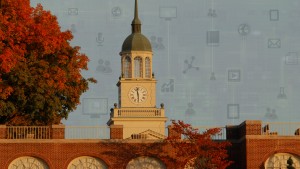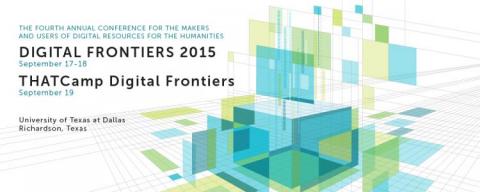At the recent Digital Frontiers Conference, organized by University of North Texas Libraries, I presented on my DH collaboration at SMU and the ways it has enhanced my career. I got a lot of “Amen!” tweets during the Q&A when I stressed that librarians should not provide service, but rather collaboration. Quite encouraging!
#DF15UTD Twitter feed
From the conference program:
Creating Digital Humanities Collaborations Using Library Special Collections
Carrie Johnston, Bucknell University; Cindy Boeke, Southern Methodist University
With their rich special collections, academic libraries are in an ideal position to partner with faculty and graduate students to host, sponsor, and/or support Digital Humanities projects. The Norwick Center for Digital Services (nCDS), a unit of Southern Methodist University’s (SMU) Central University Libraries (CUL), has become a Digital Humanities partner in two ways: helping foster projects that utilize items from the library’s special collections, and introducing a Digital Humanities Practicum to train students to design, implement, and complete Digital Humanities projects. The practicum focuses on digitization, historical research, metadata creation, digital collections development, and outreach. Feedback from initial participants has been extremely positive.
Here are two examples. One post-doctoral student utilized the nCDS Digital Humanities Practicum to receive specialized training and advice for a project to create a multi-archival digital exhibit on the 1910 lynching of Allen Brooks in Dallas, entitled “The Lynching of Allen Brooks and the Disappearance of the Elks Arch.” An nCDS Digital Humanities Practicum project by Carrie Johnston brought to light new information on the development of tourism in the U.S. Southwest. At the turn of the 20th century, the Fred Harvey Company was instrumental in bringing tourism to the Grand Canyon and throughout New Mexico. The final project was presented on the Fred Harvey Co. Materials from the DeGolyer Library web page. This Digital Humanities project has attracted interest from unexpected venues and been beneficial in the student’s job search: Carrie recently accepted a two-year CLIR Digital Scholarship Fellowship at Bucknell University because of the work she created through the Digital Humanities Practicum.

